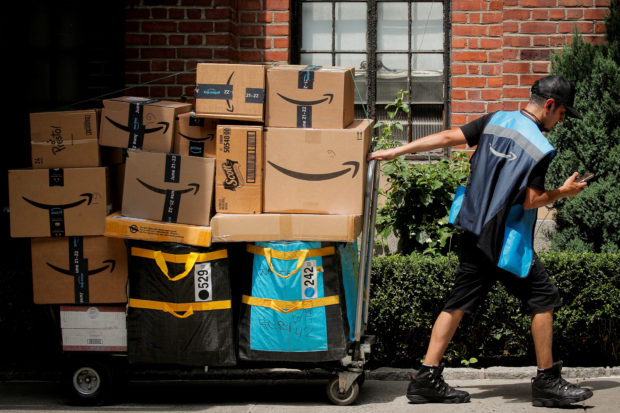An Amazon delivery worker pulls a delivery cart full of packages during its annual Prime Day promotion in New York City, U.S., June 21, 2021. REUTERS/Brendan McDermid/File hpoto
Think about something novel you started doing two-and-a-half years ago to make life easier during the COVID lockdown and chances today are that there is a related story about a stock market casualty.
Add investor worries about soaring inflation and an economic slowdown that tipped Wall Street into a bear market this year, and you will find a bleak picture for the companies that became hugely popular during the pandemic.
Connected stationary bike maker Peloton Interactive told employees last week that its fourth round of job cuts this year is a bid to save the company. Its problems put a spotlight on other pandemic hot-shots like Zoom Video Communications, Nautilus Inc, DocuSign Inc and DoorDash Inc.
Growth investors pushed Peloton stock to a $171.09 record in early 2021. Demand was so strong for its bikes that restless consumers had to wait out long delivery delays. But Peloton shares are now down 95 percent from their peak, closing at $8.53 on Wednesday. The S&P 500 by comparison is down about 25 percent from its record high in January this year.
Others bought exercise gear from Nautilus during the pandemic, sending its stock up to $31.30 in early 2021. It last traded at $1.65.
Zoom became synonymous with online meetings as many people worked remotely and even turned to video conferences for social gatherings. But Zoom’s shares were last at $75.22 versus its $588.84 peak, reached in October 2020.
Other stay-at-home favorites were online retailer Amazon.com and food delivery service DoorDash. People also flocked to consumer-friendly brokers like Robinhood Markets while stuck at home with no sports to bet on. But after scaling $85 in August 2021, Robinhood last traded at $10.66.
“These are companies with good enough ideas that they get enough funding. They catch a wave like COVID, their use explodes,” said Kim Forrest, chief investment officer at Bokeh Capital Partners in Pittsburgh. But once that growth slows, investors lose interest.
“They kind of used up all the air in their universe, and they have nowhere to grow. So, while people might still be using the Peloton, not enough people are buying the Peloton,” said Forrest.
Daniel Morgan, portfolio manager at Synovus Trust in Atlanta, Georgia, says Peloton may appear cheap, but he is wary because it is not profitable. Its price-to-sales multiple has fallen to 0.8, on a trailing 4-quarter basis, from an average multiple of 6.6 since it went public in Sept. 2019, Morgan said.
Wall Street expects Peloton to report an adjusted loss per share of $2.07 for its fiscal year ending in June compared with a loss of $7.69 in its fiscal year 2022, according to Refinitiv.
Zoom has been making money and its valuation also appears cheap at 35 times earnings per share versus an average multiple of 135 since its April 2019 debut, Morgan said.
Still, he is concerned about its profit decline. Zoom’s adjusted earnings per share is expected to fall 27 percent for its fiscal year ending in January versus 2022 growth of 55.5 percent , according to Refinitiv.
Morgan also pointed to a growth slowdown for DoorDash and retail giant Amazon.com as they are also being hurt by soaring inflation and economic uncertainty.
“Each company is going to have to see how their particular business model can execute in a normalized environment,” he said.
Carol Schleif, deputy chief investment officer at BMO’s family office in Minneapolis, cautioned against investing in companies that look cheap and have loyal customers. It’s all about management, balance sheets and projected income, she said.
While one possible outcome for pandemic favorites with slowing growth could be a buyout by a larger company, Schleif is wary of making this bet.
“Buying a stock because you think it’s going to get taken out, that’s a risk. I wouldn’t be willing to do it with any money I wasn’t willing to lose,” she said. “It’s not really investing. It’s more opportunistic.
Read Next
Subscribe to INQUIRER PLUS to get access to The Philippine Daily Inquirer & other 70+ titles, share up to 5 gadgets, listen to the news, download as early as 4am & share articles on social media. Call 896 6000.
For feedback, complaints, or inquiries, contact us.
For all the latest Business News Click Here
For the latest news and updates, follow us on Google News.

